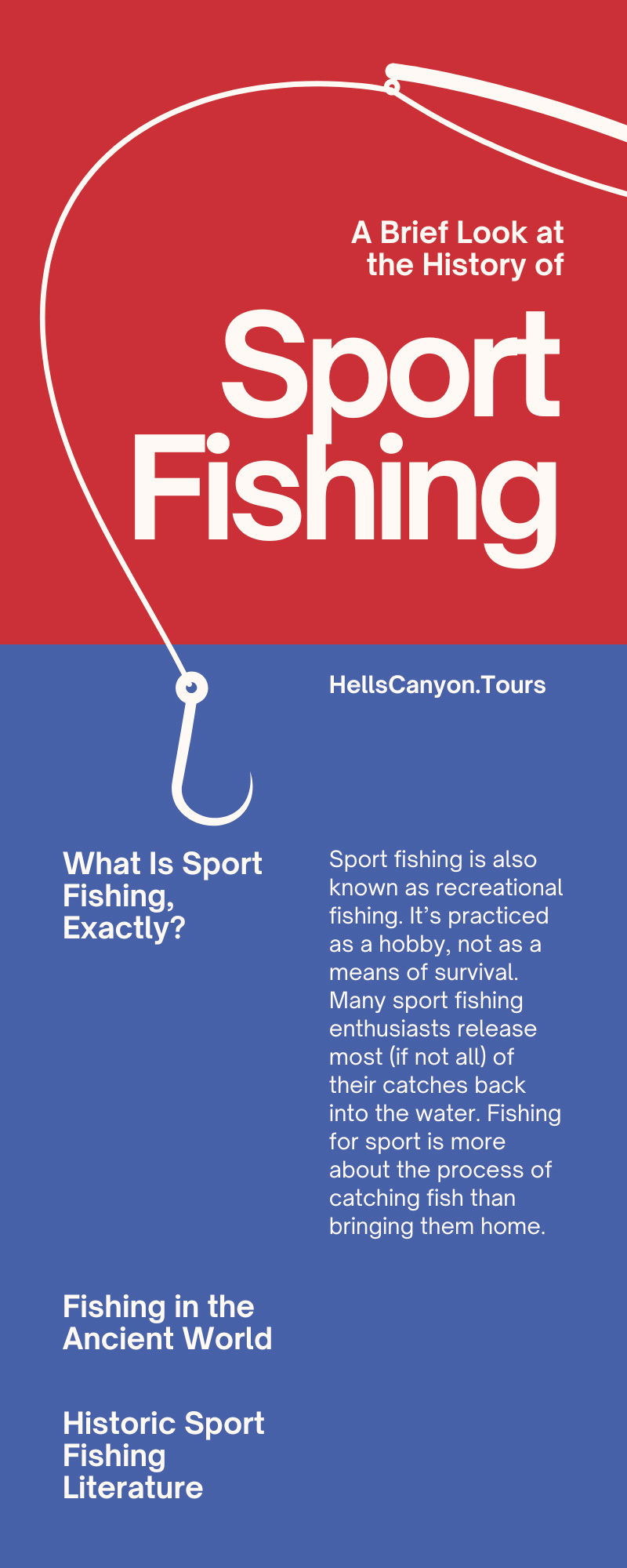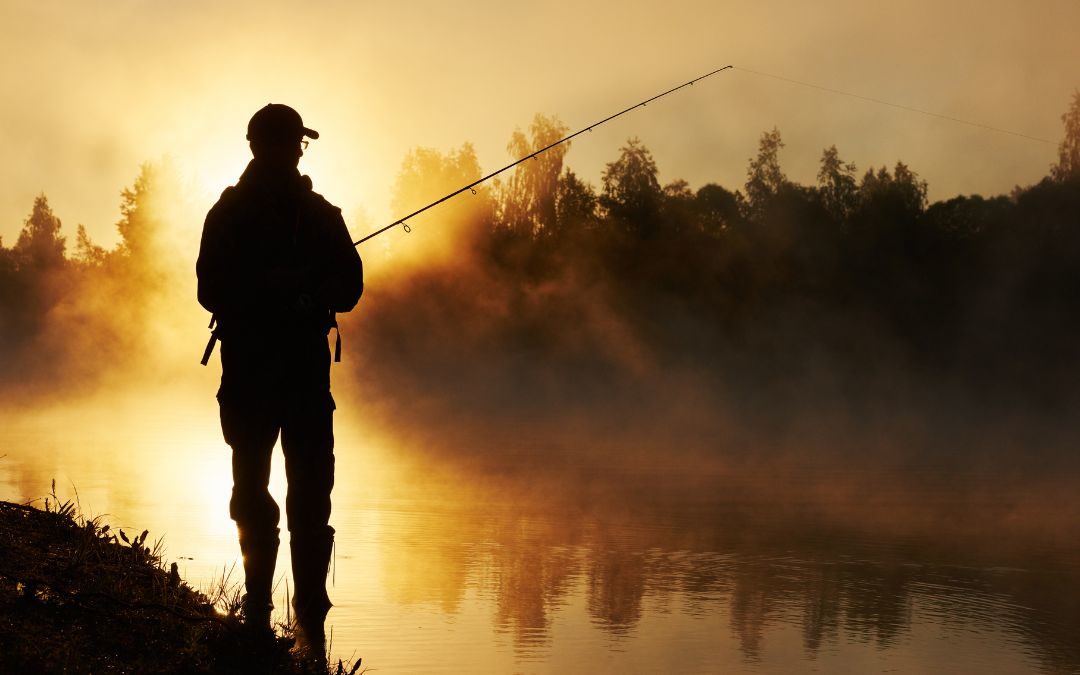It’s a little-known fact that sport fishing is a hobby that has existed in one form or another for thousands of years. Since humans first created tools, they’ve used them to improve their lives by hunting for survival as well as inventing new recreational activities.
Whether you’re an avid fishing enthusiast or a beginner with your first rod and reel, you are contributing to a long and storied tradition when you fish Hells Canyon. The Snake River has been a source of food and recreation for human settlements for thousands of years!
Want to learn more about the history of sport fishing? River Adventures has compiled a brief guide to give more historical context to the sport.
What Is Sport Fishing, Exactly?
How does sport fishing differ from other fishing traditions?
Sport fishing is also known as recreational fishing. It’s practiced as a hobby, not as a means of survival. Many sport fishing enthusiasts release most (if not all) of their catches back into the water. Fishing for sport is more about the process of catching fish than bringing them home.
There are a few different varieties of sport fishing, depending on the fisherman’s style and preferred waters.
- Fly fishing is perhaps the simplest and most popular subset of sport fishing. All the angler needs are a rod, a reel, and a weighted lure.
- Competition fishing puts the “sport” in “sport fishing” as teams compete to catch the most fish possible in a particular area. Ice fishing tournaments, fly fishing championships, and even bass fishing competitions are common with sport fishing enthusiasts.
- Saltwater sport fishing is popular with folks who live near the sea and prefer to target a particular species. From marlin to tarpon to a variety of swordfish, the oceans offer a wide variety of fish to catch (and often release) for fun.
- Freshwater sport fishing allows more landlocked fishing enthusiasts to enjoy the fun. Many freshwater sport fishing enthusiasts target abundant species like bass, pike, and walleye.
Fishing in the Ancient World
The practice of fishing, whether for survival or fun, has existed since prehistoric times. In 1957, archeologists discovered a carved bone in Japan that depicted a man using a recognizable rod and fishing line to catch fish. The carving dates back to between 29,000 and 27,000 BCE!
Ancient Egyptians also fished for sport and recorded their activities. Papyrus scrolls and carvings on tomb walls depict people using hooks, harpoons, and even woven nets to catch various fish in the Nile River.
Records show fishing enthusiasts in ancient Macedonia using artificial lures, not unlike the ones that sport fishermen use to this day. Humans in nearby civilizations like Greece and Rome also fished for fun and created art of the sport through mosaics and vase paintings.
Here in America, Indigenous populations have been fishing for as long as they’ve lived near water. Petroglyphs and pictographs depict early Native Americans using spears and wooden hooks to catch fish.
Historic Sport Fishing Literature
In 1496, a woman named Prioress Dame Juliana Berners wrote what fishing historians agree is the first English-language book dedicated to fishing. The title of the book is Treatyse of Fysshynge With an Angle (Middle English for Treatise of Fishing With an Angle).
Within, she wrote, “[G]ood sports and honest games are the cause of a man’s happy old age and long life.” Centuries later, sport fishing enthusiasts agree that she was right!
In her book, Berners also emphasized fly fishing, as opposed to bait-and-hook, or “lure,” fishing. With the increased mass production of fishing flies, fishing for sport entered the mainstream. Several of the flies Berners described in her book are still in use today!
Many years later, in 1653, Izaak Walton published the first edition of The Compleat Angler, one of the most famous books ever written on sport fishing. To date, it is one of the most reprinted books in the English language, alongside famous works like the Bible and the collected plays of Shakespeare. Walton aimed to teach the sport of fishing in a scholarly manner to everyone who wanted to give it a try!
Advancements in Sport Fishing Technology
During the latter half of the Renaissance period, craftspeople in various disciplines worked to improve upon the fishing gear pioneered by ancient peoples. Advancements in metalworking produced stronger hooks. Artisans designed more durable and realistic lures. Avid sport fishing enthusiasts experimented with horsehair, gut, and other materials to create durable fishing lines.
In The Art of Angling, published in 1651, famous sport fisherman Thomas Barker penned the first written reference to the fishing reel. Because fishing lines were now stronger and longer, fishermen needed a way to store their extra line.
By the end of the eighteenth century, fishing rods with attached reels were commonplace among sport fishing enthusiasts. In 1810, an American watchmaker named George Snyder used his skill and precision to devise a bait-casting reel now commonly known as the Kentucky Reel after Snyder’s home state.
The Industrial Revolution of the late nineteenth century lead to the mass production of rods, reels, hooks, and other fishing equipment. Mass production meant easy access and affordable prices for everyone who wanted to try their hand at fishing for sport.
Modern-Day Recreation
To this day, sport fishing enthusiasts enjoy the results of centuries—millennia, even!—of advancement. Simple fishing equipment like rods, reels, and tackle is financially accessible to people of all different classes and cultures. When you bring your fishing gear to Idaho for a relaxing day of Hells Canyon fishing, you engage in a part of history.
Today’s sport fishing may not look exactly like the recreational fishing enjoyed by early Native American settlements or ancient Egyptians. However, there are more similarities than there are differences! Humans have fished for fun as well as for food ever since we figured out how to make tools.
Recreation is essential for human beings to thrive as well as to survive. Let this brief look at the history of sport fishing inspire you to engage in an ancient sport and attune yourself to the natural world around you.


Recent Comments